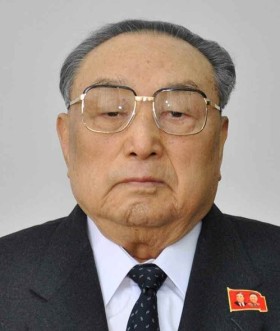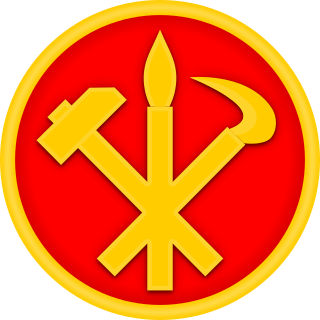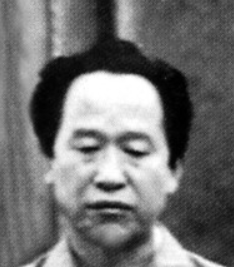Related Research Articles
The Democratic Front for the Reunification of Korea (DFRK), also known as the Democratic Front for the Reunification of the Fatherland (DFRF) or the Fatherland Front, was a North Korean popular front formed on 25 June 1949 and led by the Workers' Party of Korea (WPK). It was initially called the Fatherland United Democratic Front.

The Workers' Party of Korea (WPK) is the sole ruling party of the Democratic People's Republic of Korea, commonly known as North Korea. Founded in 1949 from a merger between the Workers' Party of North Korea and the Workers' Party of South Korea, the WPK is the oldest active party in Korea. It also controls the Korean People's Army, North Korea's armed forces. The WPK is the largest party represented in the Supreme People's Assembly and coexists with two other legal parties that are completely subservient to the WPK and must accept the WPK's "leading role" as a condition of their existence. The WPK is banned in the Republic of Korea under the National Security Act and is sanctioned by the United Nations, the European Union, Australia, and the United States.

Kim Il was a North Korean politician who was served as Premier of North Korea from 28 December 1972 to 19 April 1976.

The Central Military Commission of the Workers' Party of Korea (CMC) is an organ of the Central Committee of the Workers' Party of Korea (WPK) which heads the Korean People's Army (KPA).

The Central Committee of the Workers' Party of Korea is the highest organ between national meetings of the Workers' Party of Korea (WPK), the ruling party of North Korea. According to WPK rules, the Central Committee is elected by the party congress and the party conference can be conferred the right to renew its membership composition. In practice, the Central Committee has the ability to dismiss and appoint new members without consulting with the wider party at its own plenary sessions.

Kim Yong-ju was a North Korean politician and the younger brother of Kim Il Sung, who ruled North Korea from 1948 to 1994. Under his brother's rule, Kim Yong-ju held key posts including Politburo member in the Workers' Party of Korea (WPK) during the 1960s and early 1970s, but he fell out of favour in 1974 following a power struggle with Kim Jong Il. From 1998 until his death in 2021, he held the ceremonial position of Honorary Vice President of the Presidium of the Supreme People's Assembly (SPA), North Korea's parliament.

In North Korea, the Political Bureau of the Central Committee of the Workers' Party of Korea (WPK), or simply the Politburo, formerly the Political Committee (1946–61), is the highest decision-making body in the ruling party between sessions of its Central Committee. Article 25 of the Party Charter stipulates that "The Political Bureau of the Party Central Committee and its Standing Committee organize and direct all party work on behalf of the party Central Committee between plenary meetings. The Political Bureau of the Party Central Committee shall meet at least once every month." The Politburo is elected by the Central Committee of the Workers' Party of Korea.

The Secretariat of the Workers' Party of Korea, formerly known as the Executive Policy Bureau (2016–21), manages the work of the Politburo of the Workers' Party of Korea and its Presidium. The General Secretary leads the work of the Secretariat, and the body is composed of several members.

The 6th Congress of the Workers' Party of Korea (WPK) was held in the February 8 House of Culture in Pyongyang, North Korea, from 10 to 14 October 1980. The congress is the highest organ of the party, and is stipulated to be held every four years. 3,062 delegates represented the party's membership; 117 foreign delegates attended the congress, without the right to speak. The congress saw the reappointment of Kim Il Sung as WPK General Secretary and the Presidium of the Politburo established as the highest organ of the party between congresses.

Kang Yong Sop was a North Korean politician, second son of deputy prime minister Kang Ryang-uk and Song Sok-jong. He served as chair of the Korean Christian Federation (KCF) and vice-president of the Korean Council of Religionists. He was also vice-president of the North Korean branch of the Pan-Korean Alliance for Reunification (PKAR), delegate to 12th Supreme People's Assembly (SPA) and member of the SPA Presidium, and director of the Pyongyang Theological Academy.
Kang Min-chol is a North Korean politician. He is Minister of Mining Industries in the Cabinet of North Korea, and an alternate member of the politburo of the Central Committee of the Workers' Party of Korea (WPK). He was a delegate to the 12th session of the Supreme People's Assembly.
Kang Tong-yun is a North Korean politician. He is a Colonel General of the Korean People's Army and a member of the Central Committee of the Workers' Party of Korea (WPK).

Kang Nung-su was a North Korean literary critic and politician. He was a vice premier and member of the politburo of the Central Committee of the Workers' Party of Korea. He was a delegate to the 12th and 13th sessions of the Supreme People's Assembly.
Pak Jae-gyong is a North Korean politician and soldier. A general in the Korean People's Army (KPA), Pak is a Vice Minister in the Ministry of People's Armed Forces as well as a full member of the Central Committee of the Workers' Party of Korea (WPK). Pak is also a delegate of the 12th Supreme People's Assembly (SPA). He is one of the two survivors of 31-member commando unit, known as Unit 124, that was sent to assassinate South Korean president Park Chung Hee in the Blue House raid in 1968.

The Propaganda and Agitation Department, officially translated as the Publicity and Information Department, is a department of the Central Committee of the Workers' Party of Korea (WPK) tasked with coordinating the creation and dissemination of propaganda in North Korea. It is the highest propaganda organization in the country.

The United Front Department of the Workers' Party of Korea is a department of the Central Committee of the Workers' Party of Korea (WPK) tasked with relations with South Korea. It conducts propaganda operations and espionage and manages front organizations, including the Chongryon.
Kim Phyong-hae is a North Korean politician. He was a Vice Chairman of the Workers' Party of Korea (WPK) and the director of the Cadres' Affairs Department of the WPK. He is a full member of the 7th Central Committee of the WPK and a full member of the Politburo of the WPK. Kim is also a deputy to the 13th Supreme People's Assembly.
Choe Hwi is a North Korean politician. He is a Vice Chairman of the Workers' Party of Korea (WPK) and the chairman of the State Physical Culture and Sports Guidance Commission. Choe's portfolio as the Vice Chairman of the party covers workers' and social organizations affairs. Choe is also an alternate member of the Politburo of the WPK, member of the Central Committee of the WPK, and a deputy to the Supreme People's Assembly.
Ri Il-hwan is a North Korean politician and a member of the Political Bureau of the Central Committee of the Workers' Party of Korea (WPK). He is currently the director of the Propaganda and Agitation Department (PAD) of the party.

Kim Jung-rin (Korean: 김중린) was a North Korean politician who was an alternate member of the Politburo of the Central Committee of the Workers’ Party of Korea, as well as a member of the Politburo and party secretary.
References
- ↑
- ↑ 통일부 북한자료센터 주요 인물 정보. Ministry of Unification Information Center on North Korea . Retrieved 2012-01-10.
- ↑ "Members and Alternate Members of WPK Central Committee". Korean Central News Agency. 2010-09-28. Archived from the original on 2015-05-18. Retrieved 2014-03-22.